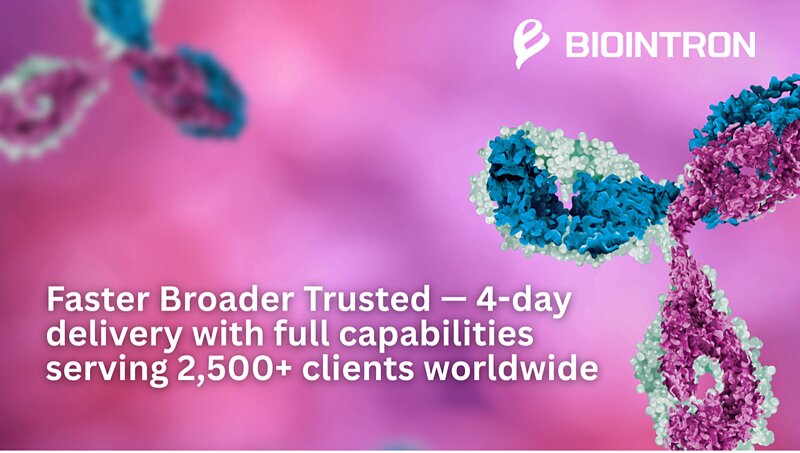From Target to Therapeutic: Rethinking Antibody Discovery
This blog post was written by Biointron, a leading high-throughput recombinant antibody/protein expression and discovery service provider. Their services are available on Scientist.com.

Introduction: Antibody Discovery at a Turning Point
Monoclonal antibodies (mAbs) have transformed medicine. In oncology, autoimmunity and infectious disease, antibody-based therapies are among the most effective and fastest-growing drug classes. Over 100 antibody therapeutics are now approved globally, with ~6 – 13 approvals each year since 2014, and while most marketed antibodies remain monoclonal, the pipeline increasingly spans ADCs, VHH antibodies, bispecifics, IgG mixtures and fusion proteins, thus broadening both mechanisms and design space. Clinical use has expanded into hematology, neurology, ophthalmology, metabolic and musculoskeletal disease and transplantation, shifting discovery toward harder targets and new tissue contexts.
Hybridoma, phage display, transgenic fully human systems and microfluidic single-B-cell screening each demonstrate distinct strengths, from reliable immunology and well-characterized workflows to scale, speed and native heavy-light pairing.
The Evolving Landscape of Antibody Discovery
Today’s antibody discovery:
- Faster — cutting timelines from years to months or even weeks.
- More diverse — capturing antibodies against rare, hidden or structurally complex epitopes.
- Translationally aligned — delivering fully human sequences or optimized scaffolds that move directly into development.
Target choice is the make-or-break step. Because most antibodies act at the cell surface or in the extracellular space, programs benefit from pathway-level thinking to tie disease phenotypes to actionable nodes. Using the right mix of discovery platforms, e.g., VHHs for recessed epitopes, microfluidic single-B-cell screening for diversity and speed, fully human repertoires for smooth translation and sequence-level rescue of hybridomas for IP continuity, keeps options open while maintaining translational rigor.
Scientific Innovations Reshaping Discovery
Antibody discovery commonly uses multiple, complementary platforms. VHH Antibody Discovery employs camelid-derived single-domain antibodies characterized by small size and high stability. VHHs can be reformatted into bispecifics, antibody – drug conjugates and CAR constructs; caplacizumab illustrates clinical use of this scaffold.
Single B Cell Screening and microfluidics enable high-throughput interrogation of antibody-secreting plasma cells, screening up to millions of cells in one day while preserving native heavy – light chain pairing. This approach supports rapid identification of candidate sequences and can compress validation timelines to approximately three months.
Hybridoma Sequencing provides a reliable safeguard against risks such as contamination, instability or cell-line loss by capturing full-length VH/VL sequences. By enabling recombinant expression independent of the original cell line, it ensures sequence continuity and supports downstream engineering or disclosure needs, without relying on long-term hybridoma maintenance.
To manage immunogenicity risk and streamline translation, Fully Human Antibody Discovery combines engineered fully human repertoires (e.g., HUGO-Ab™) with high-throughput single-cell screening. This pairing supports generation of diverse, fully human leads on practical timelines while keeping developability considerations in scope from the outset.
Discovery That Thinks Ahead to the Modality
ADCs: Success increasingly hinges on site-specific conjugation, linker chemistry and payload selection, especially for solid tumors where bystander effects and resistance matter.
Bispecifics: With ~200 in clinical development, geometry, valency, epitope pairing and developability are deeply empirical; discovery should sample epitope space and pressure-test manufacturability up front to avoid late-stage traps.
Key Considerations for Discovery Success
- Target complexity - Soluble proteins, multi-pass membrane proteins, GPCRs and small molecules demand distinct immunization and screening strategies. Many new targets are multi-pass membrane proteins/GPCRs where soluble protein immunogens fail.
- Platform matching - Use VHHs for recessed epitopes or delivery constraints; single-B-cell for rare clones and speed; fully human sources for minimized immunogenicity; sequence-rescue to preserve legacy assets.
- QC rigor - Validate antigens, monitor titers and library diversity and combine affinity ranking with functional assays (e.g., internalization, ADCC).
- Developability early - Identifying potential liabilities such as poor stability, aggregation risk or low expression before advancing candidates saves both time and resources. By integrating developability assessments alongside binding and functional screening, researchers can prioritize antibodies with the best chance of progressing into successful therapeutics.
Future Outlook: From Discovery to Global Impact
The convergence of AI/ML with high-throughput experimental platforms will improve developability predictions, epitope mapping and candidate ranking before bench validation. Parallel work on equitable access that leads to shorter timelines, lower cost-of-goods sold and fit-for-purpose formats, will broaden the impact of antibody therapies in low- and middle-income countries, positioning antibody discovery as a continuing driver of therapeutic innovation.
50% OFF Antibody Expression Projects for New Clients
At Biointron, we are dedicated to accelerating antibody discovery, optimization and production. Our team of experts can provide customized solutions that meet your specific research needs, including HTP Recombinant Antibody Production, Bispecific Antibody Production, Large Scale Antibody Production, RushMab™ - Small Scale Antibody Expression Packages and Afucosylated Antibody Expression.
From now until December 31, 2025, Biointron is celebrating our 2,500+ global clients by offering ALL new clients our biggest introductory offer:
✅ 50% OFF your first antibody expression project or 2 FREE 30 mL monoclonal antibody samples
✅ Priority support & RushmAb™-Gene 4-day delivery
✅ Priority delivery & expert technical support
Fill out this online contact form, or contact us at info@biointron.com or +1(732)790-8340 to receive the discount directly. Our Biointron experts on expression services will be in contact with you to communicate details of your expression needs and give you a direct discount upon your purchase.
Connect with Biointron on Scientist.com
